
Black squirrel threeway!
May 1st, 2009
I'm...really not quite sure what was going on here.
Whatever it was, it went on for some time.



Color And Song
April 29th, 2009
Mud Lake is overflowing with color and song. First-of-spring sightings:
- Great Crested Flycatcher
- Gray Catbird
- Warbling Vireo
- More Ruby-Crowned Kinglets than you can shake a stick at.
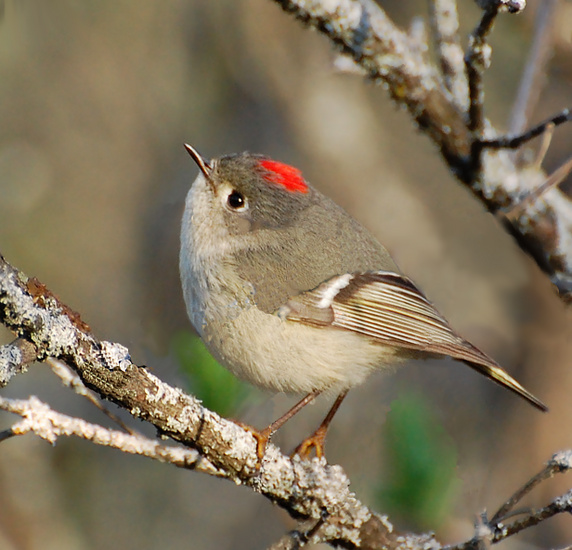
Ruby-Crowned Kinglets are a tiny bit less hyperactive than Golden-Crowned Kinglets. The male's ruby crown is usually hidden. But when he gets excited (due to a territorial dispute with another kinglet, for instance), his crown feathers ruffle and the red appears, usually in a "blink and you miss it" moment. When I get a focus on one of them, I rapid-fire and hope I manage to capture that moment.
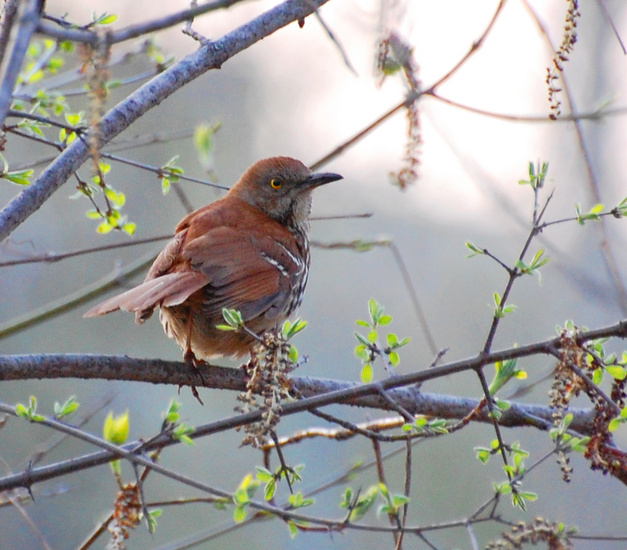
A Brown Thrasher in the early morning light. Along with mockingbirds and catbirds, thrashers are mimids. Their songs are intricate and variable, and they are capable of imitating other birds. Thrashers tend to be elusive when they're not singing.
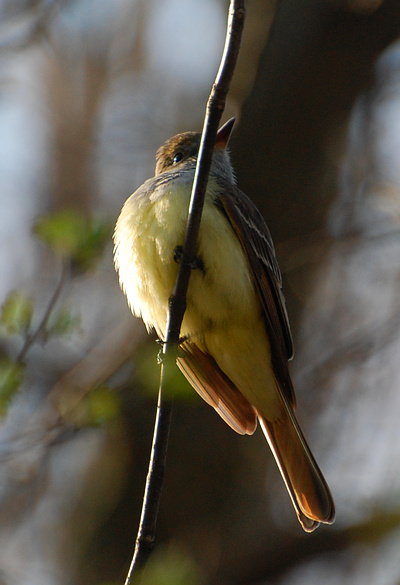
Like other flycatchers, the Great Crested Flycatcher will perch in the open, sally up to snatch the occasional flying insect, then drop back down. This bird is known for the odd habit of including a shed snakeskin in its nest lining. Naturalists theorize that it's a ruse for warding off predators.
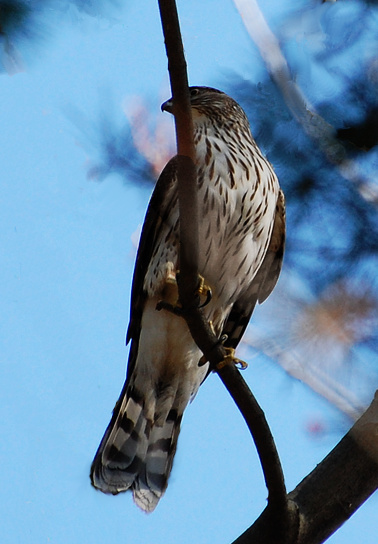
An ungodly racket of angry crows announced this final bird, a juvenile (first-year) female Cooper's Hawk. They chased her out of the woods and she ended up perching practically right above me, looking nervously back at the mob.
According to another birder who got there before me, she's mated to a mature male and they're likely planning to nest at Mud Lake. He also claimed that, when it all started, she was attempting to hunt one of the crows! I hadn't heard of a Cooper's Hawk (or indeed any hawk) being quite that ambitious before. Presumably she's learned her lesson.
River Angel
April 28th, 2009

1680x1050 wallpaper
Ring-Billed Gull on the Rideau rapids near Carleton.
A Flash Of Gold
April 27th, 2009
Our recent summery weather has opened the floodgates on songbird migration. Yellow Warblers are back. This beautiful bird is Ottawa's most common breeding warbler.
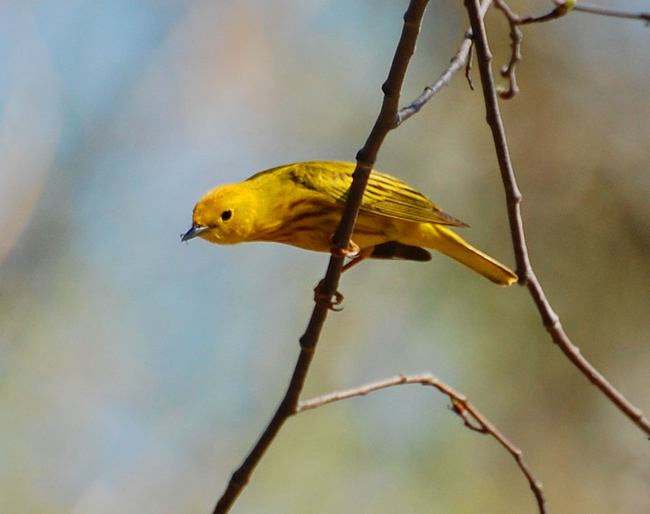
...and, I should add, I'm not the only one who is pleased with the influx of songbirds:

That would be a Cooper's Hawk, a rapacious bird-eating raptor. (I photographed her two close relatives, the smaller Sharp-Shinned Hawk and the king-size Northern Goshawk, earlier this year.) She was perched low at Hog's Back Park scanning for prey, and didn't seem to mind or even deign to notice when I got within ten feet of her.
Redwing Nesting Grounds
April 24th, 2009
Found this lady in a reed bed by the Deschenes Rapids, inspecting potential nesting grounds.
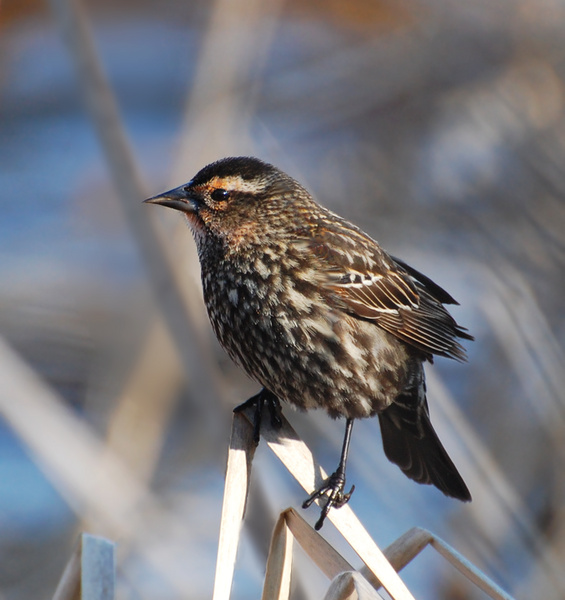
1680x1050 wallpaper
I have a big soft spot for female Redwings. There are three reasons for this. One if that I find them quite handsome, and I like the gentle expression of their faces.
Two is that they, like their mates, are gutsy when it comes to protecting their young. If you wander into Redwing nesting territory when there are eggs about, beware. Those birds fluttering in your face are not attempting to give you a friendly greeting.
And three is that when I first saw one of these, a couple years ago, I thought it was something much rarer than it was. It's not commonly known that female Red-Winged Blackbirds are neither black nor red-winged.
In the migration news, Pine Warblers have arrived and colonized the tall pines at Mud Lake, as they do each spring. This is the first warbler species of the year, at least for me--several dozen more yet to come! I also saw my first Brown Thrasher today. I have high hopes of showing off a good thrasher pic someday, Pine Warblers not so much. They spend nearly all their time in the canopy.
American Robin Portrait
April 21st, 2009
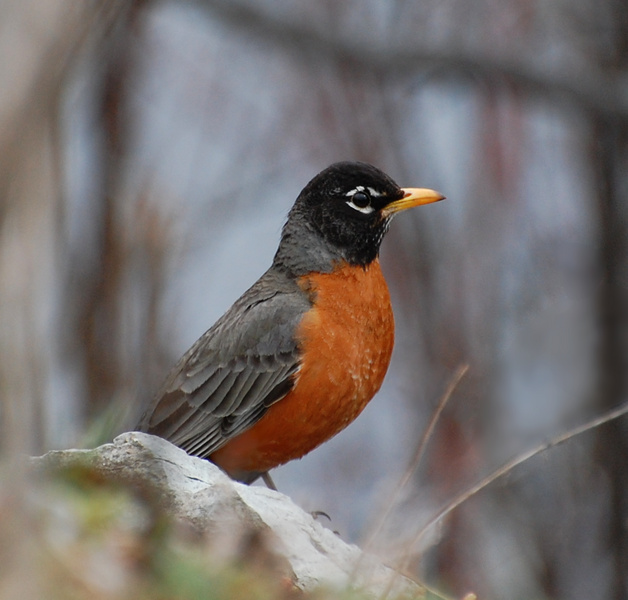
1680x1050 wallpaper
A nice portrait shot, I thought, even if our still-mostly-bare trees didn't make for much of a bokeh.
Marsh Redwing
April 20th, 2009
I was surprised how painting-like this came out. It is, in fact, a nearly unaltered photograph of a Red-Winged Blackbird, taken at the Dow's Lake marsh last Wednesday.
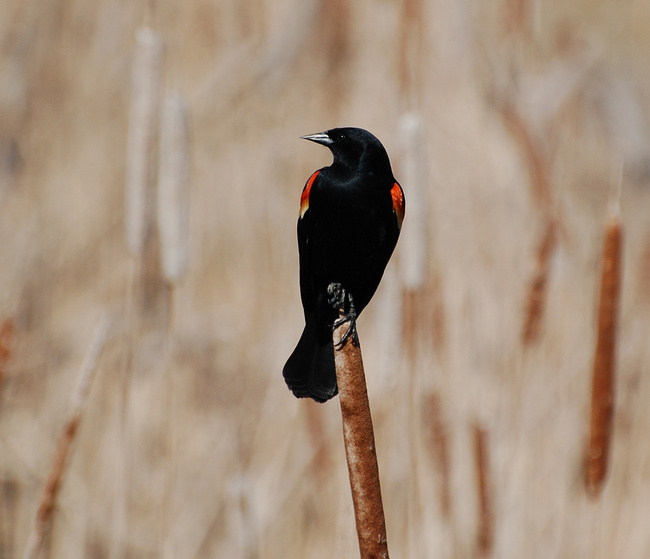
1680x1050 wallpaper
Iridescence
April 18th, 2009
Breeding starlings are so beautiful.

A scoundrel of a bird
April 16th, 2009
I found another singing Brown-Headed Cowbird at Fletcher Wildlife Garden, this time in their backyard garden and with camera in hand (me, not the bird.)

1680x1050 wallpaper
"By human standards, the female cowbird is not only a born sneak but a shiftless parasite as well. She builds no nest of her own but goes snooping about the shrubbery until she locates one of another bird smaller and weaker than herself; she lays her egg in it and goes merrily on her way, never bothering to call around to see how her offspring is faring under the care of its foster parents. And how does it get along? It gets along far too well, for being larger than its fellow nestlings it gluttonously grabs most of the food brought by the victimized parents. Because of its unfair advantage, the baby cowbird is sometimes the only nestling to survive, the weaker ones being suffocated or pushed out of the nest as the little monster gradually takes over the entire space."
- http://museum.gov.ns.ca/mnh/nature/nsbirds/bns0396.htm
There is also such a thing as a cowbird mafia. Naturalists have observed cases where a female will return to where she laid her egg. If the egg is still there, all is well. If it isn't, she trashes the nest.
Dastardly birds, really. But pretty.
Love And War
April 14th, 2009
'Tis the season to see interesting water birds at Dow's Lake. Common Mergansers all over the place, a few Hooded Mergansers, and a lone Double-Crested Cormorant sunning on a rock. Over at Fletcher Wildlife Garden, a male Brown-Headed Cowbird was singing at the edge of a field.
Some trivia:
- Mergansers: fish-eating diving ducks. ("Diving ducks" are ducks who
submerge all the way underwater when feeding.) All female mergansers have
shaggy orangeish-brown crests.
- Cormorants: Odd, rather prehistoric-looking black water birds, related to
pelicans. Unlike most water birds, their wings aren't waterproof, so they have
to stand in the sun and dry them off periodically.
- Brown-Headed Cowbird: A small blackbird that lays its eggs in other birds' nests. The hosts then raise the young, sometimes at the expense of their own chicks, unless they're smart enough to evict the foreign eggs on sight. Historically Cowbirds followed the movements of bison, which is why they didn't have time to nest on their own.
Finally I found the culprit: a lone female Red-Winged Blackbird. She flew off, pursued by nearly every male in sight, and took shelter in some underbrush at the marsh edge, flicking her tail and looking only mildly perturbed.
Coming soon: baby Red-Winged Blackbirds!
|
